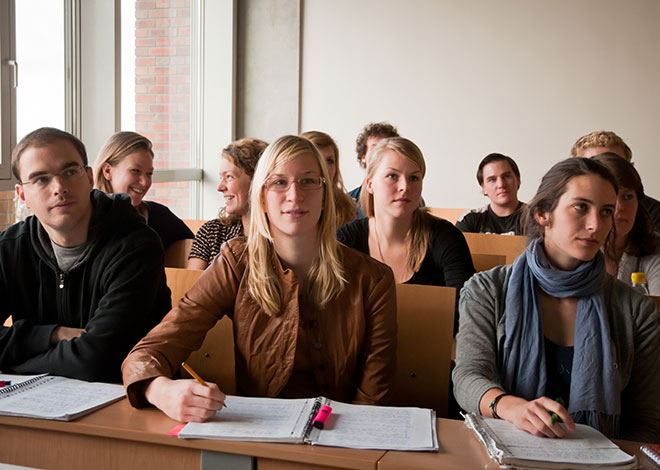Road from higher vocational education to university is often bumpy
There are 800 university Master’s programmes in the Netherlands, more than 100 of which are not open to those with a higher vocational education Bachelor’s degree. Here I will briefly summarise the article and describe the minister’s stance on the issue. The road from higher vocational education to university is often bumpy. However, signing cooperation agreements between institutes of higher vocational education and universities, can certainly streamline this transition. There are also more options if higher vocational education graduates contact the universities directly. Nevertheless, marked differences exist between universities. (‘The road from higher vocational education to university is often bumpy‘ in Dutch)

Road from higher vocational education to university: mission impossible?
The Dutch Student Union conducted research on how difficult or easy it is to enrol in a university Master’s programme with a higher vocational education Bachelor’s degree. Their findings: it’s quite the challenge indeed. Nevertheless, this transition should be possible. In fact, it is a legal requirement for universities and the objective of the minister of Education, Culture and Science.
What is the Bachelor-Master system?
The goal of the Bachelor-Master system is as follows: there are two types of Bachelor’s programmes in the Netherlands. You can enrol in a higher vocational education Bachelor’s programme if you have an intermediate vocational education diploma (MBO), a senior general secondary education diploma (HAVO) or a pre-university education diploma (VWO). This type of Bachelor’s programme lasts two years and consists of both theory and practice. Both aim to train students to become highly educated professionals. Students graduate in four years.
University Bachelor’s programme
A university Bachelor’s programme consists largely of theory-based learning and lasts three years. When you graduate, you are not yet ready to enter the labour market. To prepare you for this, you first have to enrol in a Master’s programme, which lasts one to three years depending on the programme. Most universities train you to become a scholar and teach you the ins and outs of conducting scientific research.
Other knowledge and skills
While Bachelor’s programmes can differ considerably, some general assumptions can be made. Higher vocational education Bachelor’s programmes prepare you for entering the workforce, while university Bachelor’s programmes are rooted in science. As a result, students acquire different knowledge and skills. This makes the road from higher vocational education to university often bumpy. If a higher vocational education student chooses to pursue a university Master’s degree, he or she should contact the university as soon as possible. Higher vocational education students have considerable academic freedom in their second year, often being able to choose their own courses. It’s a good idea to choose courses that will help them brush up on their knowledge before they enrol in a university programme. The student advisor for the preferred Master’s programme can explain which courses to follow. In short, it is indeed possible to transition from higher vocational education to university if you’re well prepared.
Transfer programmes
Some universities and universities of applied sciences have made agreements about academic transfers. One example is the collaboration between Wageningen University and the green universities of applied sciences. Students who want to enrol in a university Master’s programme can follow a minor during their higher vocational education Bachelor’s degree or choose a curriculum geared specifically towards academic transfer. There are plenty more examples like this one. Are you a prospective student considering a transition from higher vocational education to university? If so, it’s wise to ask about this during the study choice process. Planning to transition from higher vocational education to university? It’s important to explore the options on time and to ask targeted questions during university open days about transitioning from higher vocational education to university.
Transition programme or pre-Master?
Some students can only start preparing for a university Master’s programme after they obtain a vocational Bachelor’s degree. In this case, they have to enrol in a transition programme or a pre-Master’s programme. The latter may be short or long, depending on the student’s prior education and on the requirements of the university Master’s programme. Your choice of Master’s programme is therefore extremely important.
Problems
According to Trouw, the Dutch Student Union encountered the biggest problems at Utrecht University, Leiden University and the University of Amsterdam. Several issues have been mentioned, including little interest in specific Master’s programmes, considerable differences between the higher vocational education level and the university level, and the extremely high cost of introducing transition programmes at universities. In these universities the road from higher vocational education to university is really bumpy.
What does the minister say?
“I think it’s important that students who can and want to transition to a Master’s programme should be able to do so. Institutions have a legal obligation to help students catch up on certain knowledge deficiencies within a reasonable timeframe in order to achieve the intake level for Master’s programmes. This is possible with the help of transition programmes, also referred to as a pre-Master. These may take the form of pre-structured programmes or individual trajectories developed to help students bridge specific knowledge gaps within a reasonable timeframe. The Dutch Student Union made it clear that there are more possibilities when students contact the university themselves.”

Research
“Previous research by ReseachNed (commissioned by the Ministry of Education, Culture and Science) found that transition programmes are quite effective and certainly help students bridge the gap between higher vocational education and university. This research also found that all universities and most universities of applied sciences offer such transition programmes. Roughly 16% of university Master’s students followed a transition programme. This amounts to approximately 7,000 students, many of whom have indicated being extremely satisfied with the content and availability of transition programmes.”


Good